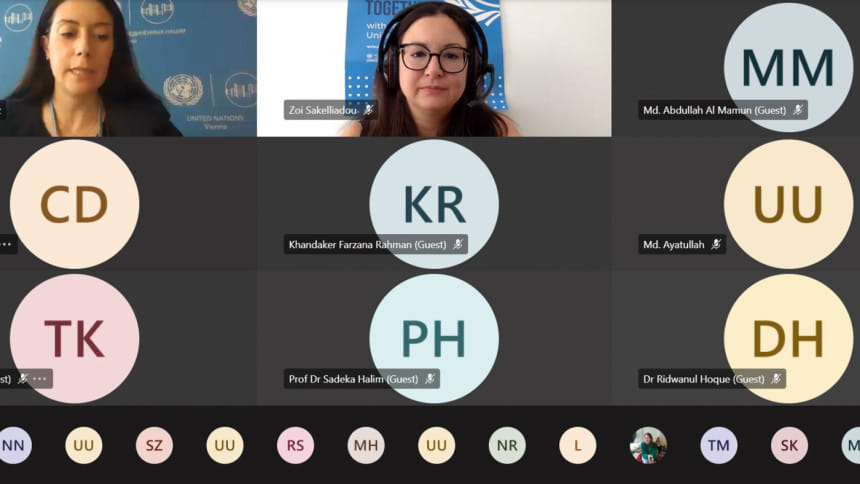UNODC Bangladesh organises an Expert Workshop with University Faculty Members: Teaching on Trafficking in Persons and Smuggling of Migrants

The United Nations Office on Drugs and Crimes (UNODC) in collaboration with the Department of law and Department of Criminology of Dhaka University organised a two days long expert workshop with faculty members on teaching on trafficking in persons and smuggling of migrants on 25 and 26 August, 2020 as part of its Global Education for Justice (E4J) initiative under the framework of GLO.ACT-Bangladesh Project. At university level, the E4J initiative aims to facilitate and promote teaching on issues which fall within UNODC's mandate areas such as anti-corruption, organised crime, human-trafficking and migrant smuggling, counter-terrorism, criminal justice system etc. The objective of this workshop was to bring together relevant university faculty members from public and private universities in Bangladesh, in their individual capacity, to discuss, reflect upon, and practice various aspects relevant to teaching the UNODC Education for Justice (E4J) Modules on "Trafficking in Persons and Migrant Smuggling.
The first day of the workshop included introductory remarks and sessions by academicians and the second day included group presentations by the participants. At the beginning of the workshop, Ms. Euridice Marquez, Moderator for the workshop and GLO.ACT Programme Management Officer, Human Trafficking and Migrant Smuggling Section, UNODC Vienna delivered welcoming remarks and provided a brief overview of the objectives of the workshop and the E4J initiative. Following her remarks, Mr. Mahdy Hassan, National Project Coordinator-GLO.ACT Bangladesh, UNODC Programme Office in Bangladesh delivered a speech on the activities of GLO.ACT Bangladesh. Welcoming remarks were also delivered by Dr. Md. Rahmat Ullah, Professor, Department of Law, University of Dhaka & Dean, Faculty of Law, University of Dhaka, Bangladesh and Dr. Sadeka Halim, Professor, Department of Sociology, University of Dhaka & Dean, Faculty of Social Sciences, University of Dhaka, Bangladesh.
The introductory remarks were then followed by a description of the E4J modules and how to navigate through the website, delivered by Ms. Zoi Sakelliadou, Crime Prevention and Criminal Justice Officer, Human Trafficking and Migrant Smuggling Section, Organized Crime and Illicit Trafficking Branch, UNODC Vienna.
After Ms. Sakelliadou's speech, Professor Claude d'Estrée, M.T.S., J.D. Professor of International Law and Human Rights Josef Korbel School of International Studies University of Denver, USA shared his experiences of teaching the E4J modules. He shed light on how he assigns prior reading assignments and invites questions from his students, which he then uses to prepare his lectures.
The speeches were followed by four sessions led by academicians. The first session was led by Ms. Khandaker Farzana Rahman, Assistant Professor & Chairperson, Department of Criminology, University of Dhaka, Bangladesh. She delivered a lecture on Concepts of Trafficking in Persons (TIP) and Smuggling of Migrants (SOM); she explained the definitions of the TIP and SOM under the Protocols to the United Nations Convention against Transnational Organised Crime (UNTOC) and outlined the differences between the two concepts.
The second session which was on the Nexus between TIP & Criminal Justice System in Bangladesh was conducted by Dr. Md. Mahbubur Rahman, Professor of Law, University of Dhaka, Bangladesh. Dr. Rahman shed light on many important considerations such as the low rates of conviction, the bureaucratic difficulties in accessing justice, the hierarchical disparities between the victims and the traffickers/smugglers etc.
Ms. Aimée Comrie, GLO.ACT Project Coordinator, Human Trafficking and Migrant Smuggling Section, Vienna, UNODC then conducted a session on the international legal framework on Trafficking in Persons. She went over the provisions of the UNTOC and the United Nations Protocol against TIP and SOM. She appreciated the near-universal recognition for the UNTOC and reiterated the importance of tackling human-trafficking around the world.
The fourth and last session of the day was conducted by Professor Ridwanul Hoque PhD, Professor, Department of Law, University of Dhaka, Bangladesh, University Professorial Fellow, Northern Institute, Charles Darwin University, Australia. Professor Hoque delivered a presentation on the Legal and Institutional Framework on Trafficking in Persons in Bangladesh. He opined that while the Prevention and Suppression of Human Trafficking Act 2012 was a well-drafted legislation but expressed concerns regarding the rates of conviction. He appreciated the setting-up of seven tribunals for tackling human trafficking cases.
After the conclusion of the sessions, the moderator invited questions from the participants. The participants raised questions regarding the need to create accountability on those who implement the law and for a need to reform the judicial framework so as to encourage victims and witnesses to come forward. At the end of the Q&As, the moderator wrapped up the workshop for the day.
The second day of the workshop included group presentations of the participants. Participants were provided with modules and were assigned to groups one week prior to the workshop. They were expected to share their insights on how to effectively teach the modules at undergraduate and graduate levels and either integrate the modules into their courses or potentially advocate for new courses. After the presentation, the participants received feedback from the facilitators. As a follow-up to the workshop, participating faculty members are expected to teach at least one module in the upcoming academic year and provide feedback to UNODC regarding their experience. In addition, UNODC will create a Network of academia to roll-out the modules on TIP and SOM in Bangladesh.
Event covered by Law Desk.

 For all latest news, follow The Daily Star's Google News channel.
For all latest news, follow The Daily Star's Google News channel. 



Comments